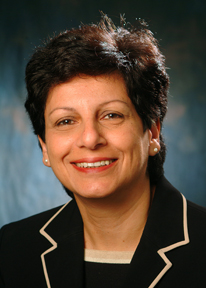 |
| Mona Fouad |
More than $13 million awarded to UAB investigators will help reduce health disparities and boost healthy living and cancer-prevention programs in minority and under-served communities. Funding also will be used to create minority cancer-education programs in the undergraduate and graduate curricula.
“These funds are helping us make a paradigm shift in the way community-based and academic research is planned and performed in the arena of health disparities,” says Mona Fouad, M.D., director of the UAB Minority Health and Research Center (MHRC).
“We hope to continue feeding a culture of collaboration that cuts across all racial, ethnic and socioeconomic barriers to benefit everyone’s health.”
The $13 million comprises grants from three funding sources, the National Cancer Institute (NCI), the Centers for Disease Control and Prevention in Atlanta (CDC) and the National Institutes of Health (NIH). Fouad and Edward Partridge, M.D., director of the UAB Comprehensive Cancer Center, are the principal investigators. Descriptions of the three grants follow.
UAB, Morehouse, Tuskegee partnership
NCI has renewed the funding for UAB, Morehouse School of Medicine in Atlanta and Tuskegee University to continue their partnership in cancer education, community outreach and research. Each institution received $5 million through the NCI Minority Institution/Cancer Center Partnership Program to support select endeavors:
• The research program will fund five research projects to investigate reasons for health disparities at the basic, clinical and population level.
• Community outreach will help recruit and retain African-American participants in cancer clinical trials through targeted awareness programs.
• Cancer education and career development will introduce faculty, graduate and undergraduate students to training and development in cancer research as it relates to minorities and encourage more minority students to enter the cancer research.
This program also will extend the training of graduate students through the development and implementation of a Cancer Research Fellows Program.
CDC REACH US grant
The CDC awarded this grant to UAB to extend the REACH 2010 grant the school received in 1999 to increase breast and cervical cancer-screening rates among black women. For its success, UAB had been named one of 18 centers of Excellence to Eliminate Disparities (CEED) in the nation.
The CDC subsequently has awarded REACH US (Racial and Ethnic Approaches to Community Health across the United States) funding to UAB to become a national clearinghouse to disseminate evidence-based strategies and models and provide technical assistance and support to other communities. UAB will focus its efforts on Louisiana, Mississippi, Tennessee, Kentucky and Arkansas.
NIH funding: $4.5 million
The National Center on Minority Health and Health Disparities, part of the NIH, will provide a five-year, $4.5 million grant to continue development of the UAB MHRC as a comprehensive health-disparities-research center:
• Research will explore the interactions between biological, clinical and social factors associated with health disparities in cancer screenings, diabetes and obesity.
• A summer enrichment program will offer researchers and health-care professionals training to help them better understand and work with minority populations and provide minority students with an introduction to the health profession.
• Outreach through the MHRC Building Healthy Communities program will better enable individuals to take charge of their health.